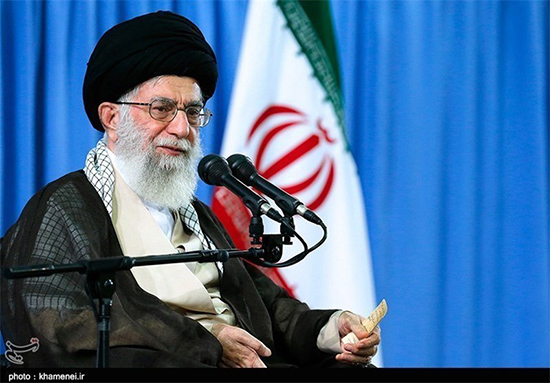
Leader of the Islamic Revolution Ayatollah Seyyed Ali Khamenei, in a meeting with members of the Supreme Council of the Center for Islamic-Iranian Model of Progress on Monday, said the goal of the 1979 Islamic Revolution is “materialization of Islamic civilization.” Referring to the wrong fundaments and inefficiency of global development models and the necessity of presenting a new Islamic-Iranian model of progress, Ayatollah Khamenei mentioned “Jihadi and revolutionary work,” “taking advantage of rich and strong capacity of Islamic sources and seminaries,” “endowment with scientific strength” and “discourse development” as the requisites for production and formulation of “Islamic-Iranian model of progress.”
Ayatollah Khamenei went on to elucidate the five phases of realization of the Islamic Revolution’s goals and their relation with the model of progress, saying: “The first stage in this process is the formation of Islamic Revolution and immediately after that an Islamic establishment must be set up, which the big oeuvre of [the late] Imam Khomeini (may God’s mercy be upon him) was the formation of the Islamic establishment.”
The Leader of the Islamic Revolution said the third stage, which is currently under way, is the “formation of Islamic government” which means the formation of a government based on fully Islamic models and criteria, adding: “As long as this phase has not been materialized, the time for the ‘establishment of an Islamic society’ will not arrive and in this case, the issue of Islamic lifestyle will solely remain at the level of discourse development in the society.”
Ayatollah Khamenei said the final stage in the five-phase process of materializing the goals of the Islamic Revolution is the realization of “Islamic civilization,” noting: “Islamic civilization does not mean conquering other countries, but it means promoting intellectual influence of Islam on other nations.”
Ayatollah Khamenei said development of a model of Islamic-Iranian progress is key to materialization of “Islamic civilization” and in response to the question, “Why existing and tested models in the world cannot be a favorable model for us,” said: “The common models of development are fundamentally wrong and are based on humanism and non-divine principles, and in terms of effects and results, they have failed to deliver on their promises about such values as ‘freedom’ and ‘justice’.”
The Leader of the Islamic Revolution said unfavorable conditions seen in some countries which follow these models, in view of such indices as governments’ heavy debts, unemployment, poverty and serious class differences, are indicative of the ineffectiveness of common models, adding: “Although these societies have achieved some progress, such progress has not penetrated deep into those societies and has not led to [promotion of] ‘ethics, justice, spirituality and security’. Therefore, we must define and present our local model of progress based on Islamic fundaments and Iranian culture.”
Ayatollah Khamenei mentioned the “Islamic nature” of the model of progress as the basis of the work, emphasizing: “The requisite for the realization of this issue is [to carry out] profound Islamic research and [maintain] strong and continuous contacts with seminaries as well as erudite and informed scholars familiar with philosophical, theosophical and jurisprudential fundaments.”
Ayatollah Khamenei described paying due attention to the Iranian aspect of Islamic-Iranian model of progress as important, saying: “Iran sets the ground for the materialization of this model and if attention is not paid to culture, history, geography, ecology, customs and traditions as well as human and natural assets of the country, the model of progress will be an unrealizable and useless document.”
After elucidating the significance and necessity of Islamic-Iranian model of progress, the Leader of the Islamic Revolution explained about requisites for production of this model.
Ayatollah Khamenei said “scientific formulation and compilation,” “providing ground for discussion and exchange of views about the [progress] model,” “clear demarcation and differentiation between [the Islamic-Iranian] model and numerous versions and schools of thought in the world,” “simultaneous attention to ideals and realities,” “practicality” and “endowment with scientific strength and resistance against opposing views” are among requisites for formulation of Islamic-Iranian model of progress.
Ayatollah Khamenei went on to give some recommendations to the members of the Supreme Council of the Center for Islamic-Iranian Model of Progress. “Avoiding hastiness in the formulation and compilation of the model,” “studying weaknesses in the five-year performance of the Center,” “serious and strong criticism of common models of global development,” “serious, jihadi and revolutionary work and taking advantage of young, erudite, faithful and revolutionary researchers,” “being in contact with various organs and body of the state management” and “discourse development” were recommendations that the Leader of the Islamic Revolution gave to the members of the Supreme Council of the Center for Islamic-Iranian Model of Progress.
Stressing the significance of “discourse development,” Ayatollah Khamenei said: “By taking advantage of various organs and facilities, developing discourse must be carried out in such a way that the Islamic-Iranian model of progress will grow into a discourse dominating minds and hearts of the youth, i.e. the future generation of the country’s managers.”
The Leader of the Islamic Revolution said the necessary condition for the success in every action is “faith and firm belief” and offered gratitude to the president and members of the Supreme Council of the Center for Islamic-Iranian Model of Progress.
Prior to Ayatollah Khamenei’s remarks, Dr. Sadeq Vaez-Zadeh, president of the Supreme Council of the Center for Islamic-Iranian Model of Progress, presented a report on the activities and programs of the Center and various stages of compilation and formulation of Islamic-Iranian model of progress.

Add new comment